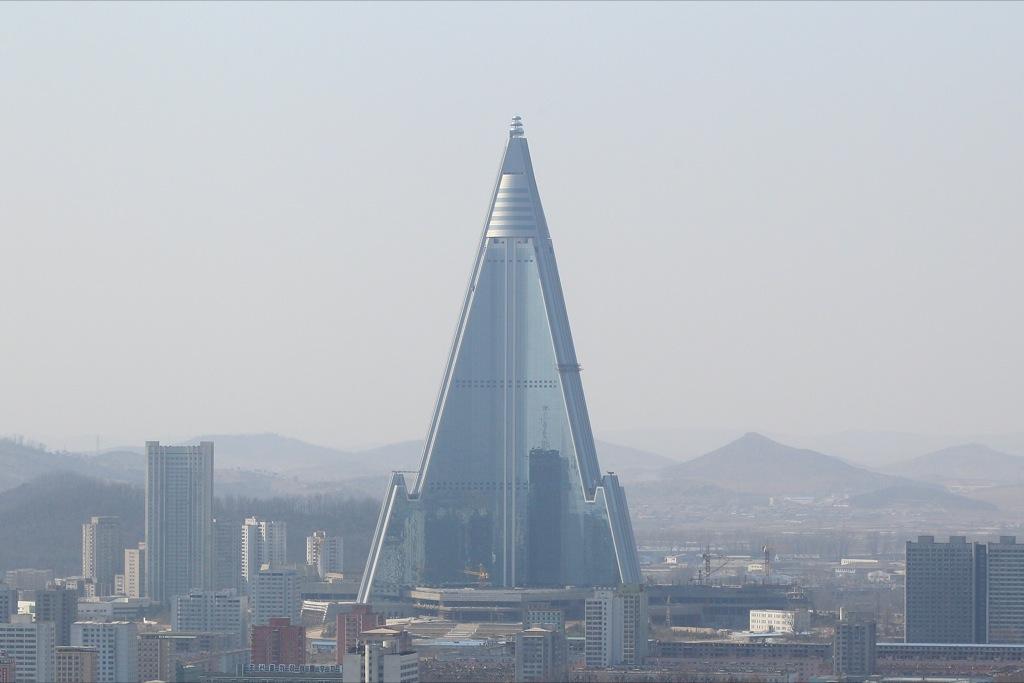Would you vacation at North Korea’s ‘hotel of doom’?
North Korea’s tallest structure, the Ryugyong Hotel, is seen on April 3, 2011 in Pyongyang, North Korea.
Next year’s most interesting hotel opening is not a six-star palatial Dubai building, or an over-the-top Las Vegas accommodation that would make Versailles look understated.
It’s Pyongyang's Ryugyong Hotel, also known as the world’s tallest hotel and the “hotel of doom” because of its long history.
The giant gray building was first begun in 1987, and will open its door for the first time next year, according to Reto Wittwer, CEO of international hotel operator Kempinski, the German company which is trying to bring the project to fruition.
Wittwer told a conference in Seoul, South Korea about his hopes for the hotel on Thursday.
So could this pyramid-shaped monster hotel herald a new era of openness in the famously closed-off country, now under the relatively new management of supreme leader Kim Jong-Un?
“The short answer is no,” Bruce Goslin, executive managing director of K2 Intelligence and an expert on the country, told CNBC.com.
“Aside from the obvious facts that it’s a hermit country, ruled by a dictatorship and most of its population are starving, there aren’t many signs of it opening up soon.”
Some in the West had hoped that the notoriously isolationalist regime might soften its approach when its new President came in following the death of his father Kim Jong-Il last year.
However, he appears to have continued with the country’s controversial nuclear ambitions.
“The new President was educated in the West and so you’d think more comfortable to opening up — but he still has to deal with a very powerful ruling military, and I don’t think they’re going to take too kindly to tourists traipsing about the countryside,” Goslin said.
“It’s an interesting development, but let’s not forget this is the same glorious leader who wanted to create an amusement park.”
One of Kim Jong-un’s better-publicized photo opportunities since gaining the Presidency was at the Rungna People's Pleasure Ground with his newly wed wife in July.
Kempinski might find it difficult when confronted with the challenges of accessing basic services like water and electricity, Goslin pointed out.
Wittwer suggested that the new hotel could be a way for the government of getting access to foreign currency.
Of course, you never know when a population could suddenly change. Very few people predicted the Arab Spring.
If there was an opening up, there would be plenty of ex-pats wanting to see family members who had been part of the regime, as well as international visitors curious to see what a closed state is like.
Goslin said this was unlikely, and argued that the government has access to hard currency through “engaging in criminal enterprises like drug smuggling.”
The investment also raises the intriguing possibility that it has been encouraged by Western governments as a way of helping North Korea to become less insular, Goslin pointed out.
Still, it’s not a reason to get excited about investment in North Korea yet, he said.
“This is not going to be one of this hotel chain’s biggest earners — it may be more symbolic than anything else,” he said.
© 2012 CNBC, Inc. All Rights Reserved
More from our partner, CNBC:
CNBC: Young, Hopeless Europeans Flock to Former Colonies
CNBC: Private Sector Jobs Rise; Claims Fall, Production Up
CNBC: The Post-Sandy Quest: Coffee … And a Shower
We want to hear your feedback so we can keep improving our website, theworld.org. Please fill out this quick survey and let us know your thoughts (your answers will be anonymous). Thanks for your time!
